7+ SAMPLE Home Renovation Contract
-

Home Exterior Renovation Contract
download now -
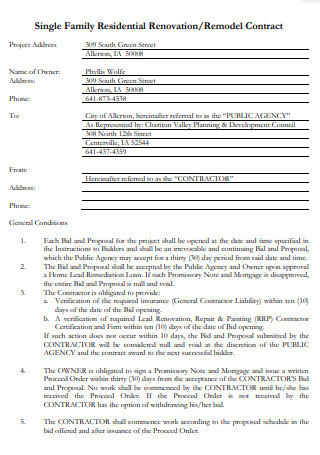
Home Renovation Contract
download now -
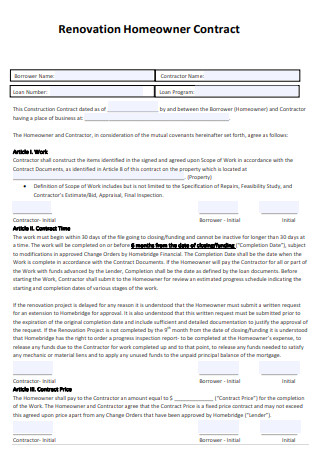
Homeowner Renovation Contract
download now -
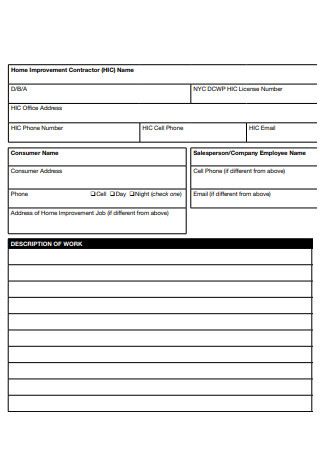
Sample Home Renovation Contract
download now -
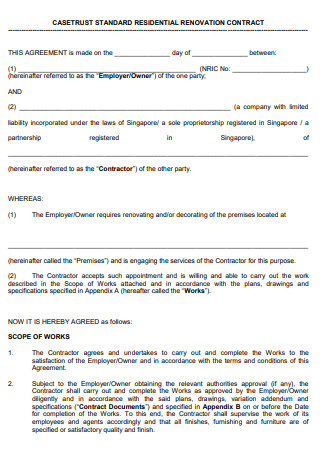
Standard Home Renovation Contract
download now -
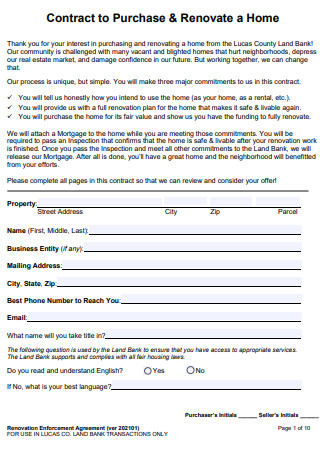
Home Renovation Contract to Purchase
download now -
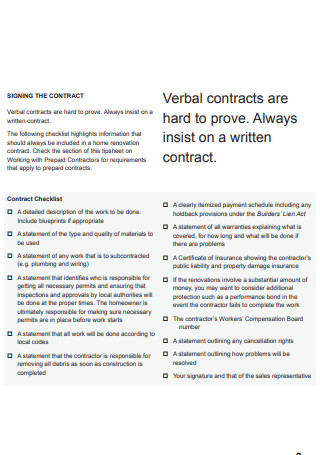
Home Renovation Verbal Contract
download now -
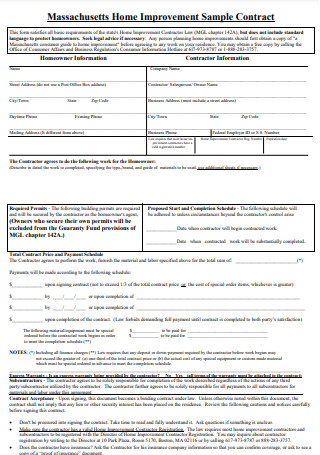
Home Renovation Contract Example
download now
FREE Home Renovation Contract s to Download
7+ SAMPLE Home Renovation Contract
What Is a Home Renovation Contract?
What Does a Renovation Contract Include?
How to Make a Home Renovation Contract
The Advantages of Working with a Professional Home Remodeling Contractor
FAQs
Is it possible to terminate a renovation contract?
How can a renovation contract protect the client and contractor?
What to avoid telling a contractor?
What Is a Home Renovation Contract?
A Renovation Contract is a form of home improvement contract that specifies key components of a real estate remodeling project. This form of the legal contract is created by a construction business or general contractor to offer precise specifics about a task and to spell out remedies for problems that may emerge during the building process. Examples of home renovation contracts have been provided and are available for you to use as a reference when you are making one for your own company or if a client is ready to proceed to the next step of the agreement.
What Does a Renovation Contract Include?
A good renovation contract covers all of the key components of a remodeling project. Construction attorneys assist construction companies in drafting remodeling contracts that are clear, succinct, and safeguard general contractors and their clients. The safest bet is to have a contract drawn up for you by an attorney. Even if you take a more informal approach, you can either by creating a new document or just making handwritten modifications to an old form, as long as both you and the contractor initial each change.
How to Make a Home Renovation Contract
Setting up a house renovation contract may be a challenge if you have no idea how the format or structure will look like, especially if you are a budding company or freelance Home renovation contractor. This is where this article will come in handy in guiding you through the process of writing an adequate home renovation contract agreement that will prove to the client of your dedication to complete their project and think through all the details they have in mind. Depending on the scope and complexity of the project, a contract might be a basic one-page document or a multi-page contract bundle. The following frequent aspects can be checked in the contract by clients and homeowners alike.
Step 1: Contracting parties
This information contains the contractor’s name, complete address, phone number, email address, and, if applicable, their business license number. Who you are, such as your name, address including the project address if applicable, and contact information.
Step 2: The scope of the work
The Renovation Scope of Work outlines the work to be done and contains a description of the project, a list of materials and goods to be used, including brand, name/number, color, and measurements, a detailed description of the contractor’s obligations, and the homeowner’s responsibilities. Complex projects need longer descriptions, and details can be sent as contract attachments.
Step 3: Timeline for the project
A start and finish date for basic projects. A comprehensive timetable that spells out major project milestones, such as foundation work completion, framing, and needed inspections, is essential for bigger projects.
Step 4: Price
The contract specifies the total cost and payment plan for the project, which includes all labor, supplies, subcontractors, and fees for permits and trash disposal. On small projects, the payment plan may consist of an initial modest down payment and a final payment. Larger projects may need one or more progress payments, which are linked to the achievement of certain project milestones. Make sure it is within the Construction Budget of the client or you both have settled on an amount.
Step 5: Workers’ compensation and contractor’s insurance
The contractor is protected by a Certificate of Insurance, which is included in the contract, if they damage your house or neighboring properties, or if they injure you or third parties. Workers’ Compensation coverage is demonstrated through a Letter of Clearance. This is specified in the contract, which is accompanied by a letter. This is a requirement for the majority of employees. You may make sure the contract defines the warranty that is given, how long it lasts, and any limits or exclusions.
Step 6: Other aspects of the deal
Other terms in a contract might include things like building permits, zoning variances, modification orders, and dispute settlement. You should make certain that the contract spells them out in great detail. Remember, if you’re unsure, don’t leave anything out; have it in writing in your contract. Otherwise, you should double-check with the client before placing it in a contract which will be much harder to change or adjust in the future or once the renovation is on the way.
The Advantages of Working with a Professional Home Remodeling Contractor
What are the benefits of hiring professional home remodeling contractors? Some people start with do-it-yourself improvements when it comes to building and home remodeling projects. In literature or on television, do-it-yourself tasks appear to be easy, but this may not be the case in real life. Contractors are critical in these types of initiatives because of their expertise. If your client is having second thoughts about working and collaborating with a professional contractor, you can present the following reasons to persuade them.
FAQs
Is it possible to terminate a renovation contract?
Homeowners who sign contracts with contractors to renovate, rebuild, or repair their houses nearly always have the right to terminate the contract within three business days after signing it, without penalty or obligation. Both state and federal laws establish the homeowner’s cancellation rights.
How can a renovation contract protect the client and contractor?
The most essential function of a Remodeling Contract is to safeguard the parties involved during and after the scope of work has been completed. A good remodeling contract spells out clear expectations and outlines what to do if something goes wrong. Renovation contracts also spell out any warranties that have been offered, as well as specifics on what is covered and for how long. If any legal claims are made against either party involved in a remodeling project, a renovation contract is crucial to settling the issue. This is because a well-written contract spells out clearly what remedies are available in the event of a disagreement.
What to avoid telling a contractor?
If the client pays in advance, never ask for a discount from a contractor. Requesting to pay a discounted amount to a contractor is highly foolish. Similarly, if the client pays home restoration contractors in full without the presence of a Home renovation contract, they may not execute a satisfactory job, or they may simply leave with the money. To cover the cost of supplies, clients will need to pay some money up ahead. Now, some attorneys could claim that the moment the client buys the supplies, they have crossed the line, and the contractor is now an employee. As a customer, they have the right to acquire their own supplies so that they know exactly what they are getting and may even have the option to choose the best quality.
As the client and contractor have discussed and settled on the necessary details in renovating their respective homes, the next step to legalize an agreement would be to set up a contract. This is where a Home renovation contract will come into the picture, along with the other elements of the contents of the contract, it will bind both parties with their agreement. Which has lawful repercussions if the other party does not go through with the final agreement between the parties. As soon as the client and contractor have settled, prepare this contract or an agreement template as soon as possible and get the signatures and contact information from both parties.
